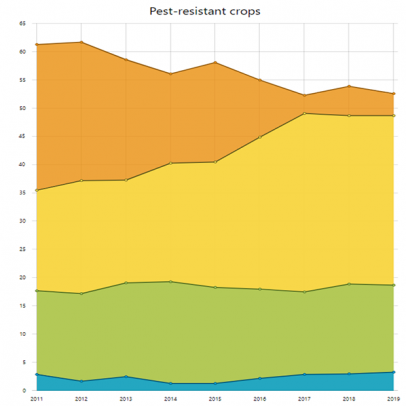
Are we using science for smarter development? (chapter 2)
On average, national progress around the world has been weakest for the core environmental Sustainable Development Goals (SDGs) for climate action (SDG13), life below water (SDG14) and life on land (SDG15).
An analysis by UNESCO of 56 research topics of high relevance to the SDGs arrived at a similar conclusion. It found that sustainability research was not yet mainstream in academic publishing at the global level. For instance, research into climate-ready crops accounted for just 0.02% of global scientific production between 2011 and 2019.
Topics related to industry, innovation and infrastructure (SDG9) fared better. Almost one-third (59) of the 193 countries studied at least doubled their output on the topic of greater battery efficiency between 2011 and 2019. There was a similar increase for smart-grid technologies (55 countries) and sustainable transportation, such as electric and hybrid vehicles (50).
Despite the priority accorded to the global energy transition, publications on nine topics related to sustainable energy (SDG7), including cleaner fossil fuel technology and wind and solar power, still only accounted for 2.4% of global scientific output over 2016–2019, up from 2.1% over 2012–2015.
Sustainability topics form far greater shares of national output by small and developing science systems. It is in these systems that growth was most visible between 2011 and 2019, such as in Ecuador, Indonesia and Iraq. These countries also tend to be on the frontlines of climate change and reliant on commodity exports. The share of scientific publications on photovoltaics emanating from lower-income countries has surged from 7.6% to 21.6% and on biofuels and biomass from 6.2% to 21.2% since 2011. Low-income countries raised their own global share of publications on photovoltaics from 0.2% to 1.4% over the same period.
For more, see chapter 2 in the UNESCO Science Report: the Race Against Time for Smarter Development.
The race against time for smarter development (sustainability)
According to the UNESCO Science Report, released on 11 June 2021, it is developing countries that are publishing most, proportionately, on sustainability science They also happen to be the ones most affected by climate change. Scientific publications on 56 sustainability topics analysed by UNESCO form only a small share of global scientific output.
Which sustainability topics are researchers in your country focusing on?
Download the study and underlying data
-
Dataset: Scientific publishing on 56 topics related to the Sustainable Development Goals
-
Supplementary dataset: Keywords used to measure scientific publishing on 56 topics related to the Sustainable Development Goals
-
Annex 4: Background information on the bibliometric study of research trends on selected topics related to the 2030 Agenda for Sustainable Development
Infographics
- Box 2.1: Research on new or re-emerging viruses has surged during epidemics
- Box 2.2: How sustainable is advanced technology?
- Figure 2.1: Scientific publications on new or re-emerging viruses that can infect humans
- Figure 2.2: Volume of global publications on selected topics related to the SDGs, 2012–2019
- Figure 2.3: Growth rate for publications on selected topics related to the SDGs, 2012–2019 (%)
- Figure 2.4: Change in the share of 56 SDG-related topics among global publications, 2012–2015 to 2016–2019 (%)
- Figure 2.5: Contribution by income group to global publishing on 56 research topics related to the SDGs, 2011 and 2019 (%)
- Figure 2.6: Number of SDG-related topics with a gain or loss in share of global output, by income group, 2011–2019
- Figure 2.8: Top 15 research topics for lower middle-income and low-income countries by increase in their share of global output, 2011–2019
- Figure 2.9: Volume of global publications on climate hazards, 2011–2019
- Figure 2.10: Top SDG-related topics based on specialization and growth in selected regions and countries, 2011–2019
- Figure 2.11: Trends in energy production and publishing
- Figure 2.12: Volume of global publications on selected biodiversity-related topics, 2011–2019
Research on new or re-emerging viruses has surged during epidemics
With the year 2020 having been dominated by the Covid-19 pandemic, one might expect there to be a voluminous research record on new or re-emerging viruses that can infect humans. There is not. There were just 7 471 publications on this topic in 2019, 35% of which were produced by scientists in the USA alone (Figure 2.1). Global output on this broad topic progressed by just 2% per year between 2011 and 2019, slower than global scientific publications overall: 3.8% per year.
The race against time for smarter development
This is the question asked by the latest UNESCO Science Report, released on 11 June 2021.





